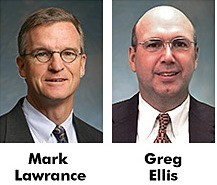 The many programs and benefits of Indiana Chamber membership include the state’s deepest and most effective group of issue experts. That team welcomes two talented additions.
The many programs and benefits of Indiana Chamber membership include the state’s deepest and most effective group of issue experts. That team welcomes two talented additions.
Mark Lawrance returns to the Chamber in the new position of vice president of engagement and innovation policy. That includes advocacy work in the areas of technology, economic development and infrastructure.
Greg Ellis begins his work May 31 as vice president of energy and environmental policy. His variety of public and private sector experiences, including serving as an administrative law judge for the Indiana Utility Regulatory Commission since 2010, will prove valuable in his work on behalf of Chamber members.
Chamber President and CEO Kevin Brinegar leads an experienced lobbying team that also includes: Caryl Auslander, education, workforce development and federal relations; Mike Ripley, health care policy and employment law; and Bill Waltz, taxation, public finance and local government reform.
“The hard work that takes place in the summer and fall – Chamber policy meetings, interim legislative panels, individual meetings with lawmakers and more – leads to effective General Assembly sessions,” Brinegar says. “Chamber members will be well represented by these issue experts and the support team we have around them.”

 The effort to introduce the concepts of efficiency and better service to citizens into Indiana’s local government structure has seen more ups and downs than your favorite ride at Holiday World or any amusement park of your choice.
The effort to introduce the concepts of efficiency and better service to citizens into Indiana’s local government structure has seen more ups and downs than your favorite ride at Holiday World or any amusement park of your choice. A small number of businesses are making a large impact on Indiana’s economic landscape. The numbers are in a new Indiana Chamber Foundation study titled Accelerating Growth in Indiana’s Mid-Market Companies.
A small number of businesses are making a large impact on Indiana’s economic landscape. The numbers are in a new Indiana Chamber Foundation study titled Accelerating Growth in Indiana’s Mid-Market Companies..gif) The title of this post also served as the subtitle of an Indiana Chamber study released earlier this year titled
The title of this post also served as the subtitle of an Indiana Chamber study released earlier this year titled